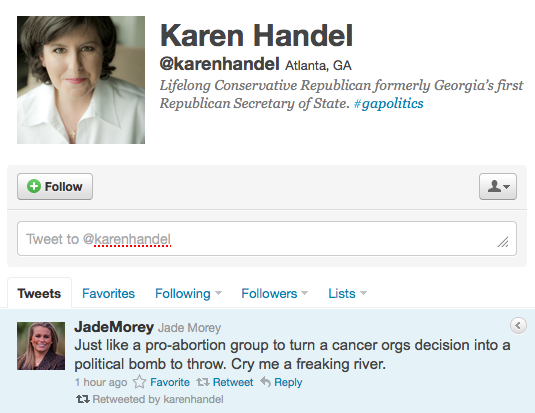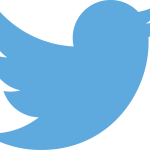 This blog by Rosetta Thurman says you can’t separate your public and private lives online.
This blog by Rosetta Thurman says you can’t separate your public and private lives online.
She’s wrong.
You can separate your public and private lives online – at least as much as you can offline. And, quite frankly, you should! She says it’s not cool to be two different people online. The reality is that, offline, you are at least two different people – and, in fact, you are probably a dozen different people. Offline, you already compartmentalize your life with regards to what information you share with others and what you do around certain people:
- When you are with certain friends, you may talk mostly about sports, and when you are with different friends, you may talk about politics.
- When you are at work, you might never bring up that you dress up for Renaissance faires.
- There are people in your life that do not want to hear about your work. They either find it uninteresting or boring or too complicated to understand. So you don’t talk about your work with them. It’s not that your work is secret – it’s just not something you talk about with everyone.
- When you are around your grandmother, you probably don’t use some of the colorful language you freely use with friends at a bar.
All those offline conversations and activities aren’t secret: it’s quite possible a co-worker is going to show up at a Renaissance faire and see you in costume. You may go to a conference and the speaker may turn out to be your socccer team coach, whom you had no idea was a lawyer specializing in risk management. But even when these worlds collide, they usually stay separate after the fact: your co-worker may greet you with “Forsooth, friend!” for a few weeks, you may be tempted to ask your soccer coach some legal questions after a game, but eventually, everyone will retreat to the roles in which they feel most comfortable.
Online, it’s no different:
- You may have two Twitter accounts, one for your professional activities and one for your Star Trek convention activities. One account might allow anyone to see your tweets, even if they don’t follow you, and the other may require all followers to be approved.
- On Facebook, you may have all of your Facebook friends in different lists (or, on GooglePlus, you may have all of your connections in different circles), and every time you post, you might include or exclude certain people or lists – you may target sports talk about your alma mater with other alumni, you may share your baby photos only with family, and you may exclude your in-laws from any of your political rants.
- You may decide your Facebook account is only for real friends – that means you might be a LinkedIn connection of someone, but when you find that person on Facebook and try to connect, the person may refuse the connection. I’ve turned down friend requests from people on social networks I use primarily for personal reasons, and I’ve been turned down a few times by professional colleagues, who say that their Facebook account is to talk to family and close friends, not people they work with.
- You may hide people you’ve friended online from your Facebook newsfeed, because you are fed up with all the cat photos or daily affirmations. You can still see news about them if you go to their pages, but you decide you really don’t need their religious comments daily.
The point: you are already being different people online – and you should be, just as you are offline!
Could a diligent person find absolutely everything you do online, despite these efforts and despite your online privacy settings? Absolutely! But outside of a stalker, that’s probably not going to happen; most of your professional colleagues will never know about your Lt. Uhura costume, because they aren’t ever going to stumble upon the Twitter feed you use specifically to talk about that. You aren’t going to bore your soccer teammates with online talk about the professional conference you attended, because they are going to unfriend you on Facebook if that’s all you’re going to talk about.
So, yes, you can separate your public and private lives online – at least as much as you can offline. And you should separate your public and private lives online, at least to a degree, just as you do offline, because not everyone wants to hear absolutely everything about you. Here’s how you do that:
- Think of everything you post online as publishing. You are producing a publication – the same as a newsletter, a flier, a newspaper, a pamphlet, a holiday letter to friends, etc. – every time you create an online account and start posting information. When you post online, you should be thinking about who the audience is for that publication – you don’t write exactly the same letter to your grandmother than you do your boyfriend/girlfriend/spouse, do you? Then why try to have a one-size-fits-all message every time you post online?
- If you associate or use your work email to create a social media account, then that account is part of your job, period. In fact, your company may require you to give up that account when you leave the company, since you associated it with your work email. If you want to use a social media account and not always be talking as an employee of a company, use a personal email to create or associate with that account.
- You may say no to Facebook friends or Twitter followers. You have that right. Just always have an alternative to offer someone. For instance, I use LinkedIn to link to people I have worked with or whose work I am familiar with. Period. I do not link to people I haven’t worked with or whose work I am not familiar with – if I did, then LinkedIn would become a meaningless phone book. When someone I don’t know wants to friend me on LinkedIn, I encourage them to, instead, like my Facebook page.
- If Facebook seems to be the place where all of the online activities of your personal friends, family and co-workers are intersecting – it’s the primary place you are interacting with people from all of those groups – then get all your contacts into lists, and be mindful every time you post. Should a political rant go to everyone, or should you exclude anyone you have coded as a co-worker? It’s a courtesy to not bombard your professional colleagues with baby photos, or to bombard your family and friends with your latest conference slideshow presentations, offline as well as on!
- Consider creating a Facebook page for your professional life, rather than friending co-workers on Facebook. A page is different than a profile: with a page, anyone can “like” your page, but people that like your page can see only what you post to that page, as opposed to seeing what you share on your profile timeline (if you have set your privacy settings so that no friends can see that content).
- Share personal things with your professional colleagues online via the online profile you’ve chosen primarily for professional activities only as much as you would offline in the office: would you pass around vacation photos at lunch? Would you invite all of your co-workers to your daughter’s wedding? Would you talk about the Renaissance faire in the break room? Would you tell your office mates about your new drummer boyfriend? It doesn’t mean you shouldn’t share personal things with professional colleagues and clients – I know that sharing my photos from my motorcycle trips has gone over quite well with co-workers and clients, and perhaps even contributed to their image of me as adventurous and outgoing (hence why I don’t share photos of myself in sweat pants, watching “Buffy” marathons, which is something I do as much, if not more, than motorcycle trips).
Can it get messy, can boundaries get blurred? Of course, just like it can offline when you’re rocking out at a concert and look over to see one of your clients in the audience, spell bound by your dancing abilities. Even if you aren’t violating any policies or doing anything illegal, your offline actions can have consequences. That’s life. A board member at a nonprofit where you volunteer may get angry at seeing you on the front page of the newspaper participating in a demonstration against something he or she supports – or seeing that you “liked” a political candidate on an online social network that he or she opposes. If you are not a spokesperson at your organization, and there’s no written policy against employees expressing political beliefs outside of the office, you should be as fine in the eyes of the organization regarding what you do online as what you do off.
Should you keep professional activities and personal activities absolutely, completely segregated? Of course NOT – clients, co-workers, and even potential employers, want to see some of your personality. Sharing photos from my personal life built a lot of bridges with my co-workers in Afghanistan once-upon-a-time.
What about creating accounts using pseudonyms? Or should you keep certain things about yourself off the Internet entirely? There is nothing at all unethical about this in certain circumstances: perhaps you are on a private online group for victims of domestic violence, because you are one yourself. Or you are an aid / humanitarian worker that visits ultra-conservative regions and would be in danger if people there knew you were gay. Perhaps you are a teacher that also writes fan fiction, and you aren’t sure all of the parents of your students would be able to separate you as a teacher from you as an author. In those cases, you have every right to use a pseudonym for certain online activities, or to not share certain information online at all.
Type your name into Google or Bing a couple of times a year and see what comes up – are you comfortable with an employer, or potential employer, or your neighbor, seeing the first 10 links to your name? If not, then start thinking more deliberately about your online behavior.
In short: once again, offline rules apply online. Be as mindful and deliberate online about information sharing as you are offline, tell the truth, just as you would in any printed publication, and you won’t worry about your integrity or image. And please – keep your online activities separate so I don’t have to see your baby’s potty training.



